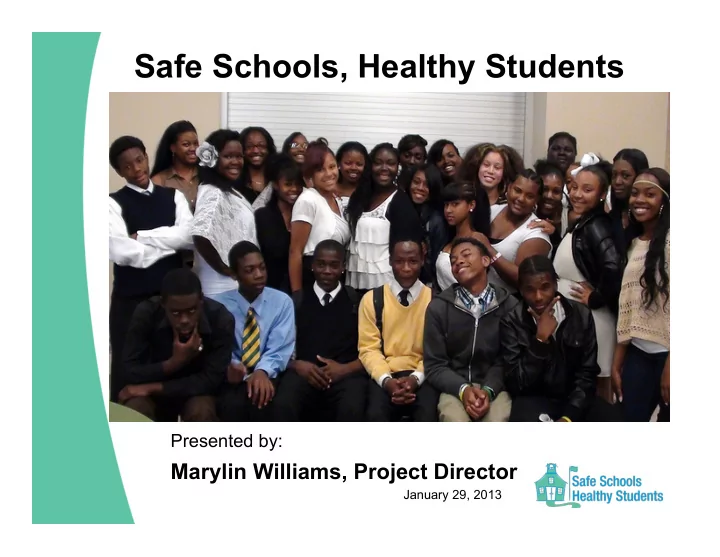

Safe Schools, Healthy Students Presented by: Marylin Williams, Project Director January 29, 2013
Problem: Los Angeles Traffic Solution: Share a Car! • Lower costs • Shorter commute • Share expenses • Save the environment
Sharing Issues • Who pays for? – Gas – Basic Maintenance – Insurance – Repairs – Keeping the car L.A. “FRESH”! • Negotiation and Agreement. – Created systems to solve issues – Everyone agreed – Group regulated
Why it worked? They worked together and created systems to solve a common problem
Safe Schools, Healthy Students Initiative A Federal grant aimed at improving school safety and student health through school-based community partnerships. Awarded almost $9 million over 4 years. Washington Involving Neighborhoods W.I.N.
WIN Program Design – 5 Elements 1. Safe School Environment and Violence Prevention 2. Alcohol, Tobacco, and Other Drug Prevention 3. Student Behavioral, Social, and Emotional Supports 4. Mental Health Services 5. Early Childhood Social & E motional L earning P rograms
WIN is a Collaborative Partnership • 16 schools ( both public and private ) • Los Angeles County Departments of Children and Family Services, Mental Health, Probation, • L.A. County Commission on Human Relations, • L.A. County Sheriff’s Department, • L.A. School Police Department, • LAUSD School Mental Health, • Cedars Sinai Psychological Trauma Center, • Catholic Big Brothers Big Sisters, and • Nurse Family Partnership Program.
WIN Coordination of Services Provide Staff Training, Parent Workshops & Presentations Coordinate Grant Programs Collect, Track and Evaluate and Interventions Grant Data Wellness Facilitators Coordinate School & Agency Case Management Community Outreach Results: Created a cost-effective environment of trust needed for successful service collaboration
WIN Program Foundation Wellness Facilitators – school-based coordinator of multi-agency services • Trusted expeditors for services • Directed collaborative services • Increased services, lowered costs Results: Cost-effective services coordination and implementation Primary Service Provider/Partner: LAUSD
WIN Program Highlights: Safe School Environment and Violence Prevention… • Educated 2,500+ Youth and Families on violence prevention & personal safety • Staff, students and parents trained Results: Increased Awareness of Threat Primary Service Provider/Partner: S uper S afe K ids C lub P ersonal S afety P rogram
WIN Program Highlights: Alcohol, Tobacco, and Other Drug Prevention… • Reported use in last 30 days and lifetime use decreased in all categories Results: Overall reduced use, increased awareness of dangers Primary Service Provider/Partner: C edars S inai Psychological Trauma Center
WIN Program Highlights: Student Behavioral, Social, and Emotional Supports… • 74% students participated in workshops on harassment and bullying • Overall decrease of student harassment Results: Greater acceptance of differences Primary Service Provider/Partner: L.A. C ounty Human Relations Commission
WIN Program Highlights: Mental Health Services… • 1,200+ Staff received referral training • 37 Parent workshops w/ 15 schools • Increase in referral & services received Results: Increased access and use of mental health services Primary Service Provider/Partner: L.A. C ounty Department of Mental Health
WIN Program Highlights: Early Childhood Social and Emotional Learning Programs… • 741 nurse home visits for prenatal care • Healthy births with 96% of caseload Results: Healthy births while students continuing or completing education Primary Service Provider/Partner:
WIN Program Highlights: Successful Results Summary… 1. Established an environment of trust for all providers 2. Mental Health service referrals and use increased 3. Increased collaboration of all services 4. Data-driven TQM for ongoing improvements 5. More overall services for less cost
Questions? Marylin ¡Williams ¡ Project ¡Director ¡ Safe ¡Schools/ ¡Healthy ¡Students ¡ ¡ marylin.williams@lausd.net ¡ 310 ¡354-‑3404 ¡
Recommend
More recommend